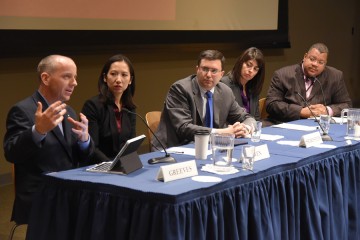In a recent Time op-ed, Meghan Bridgid Moran, an assistant professor at Johns Hopkins University's Bloomberg School of Public Health, explores the "alarming reach—and dangerous effectiveness—of the anti-vaccine movement."
Moran and her team of researchers conducted a thorough dissection of scare tactics and rhetoric employed by these purveyors of "junk science," analyzing data from 480 websites affiliated with the anti-vaxx movement. The team discovered that "anti-vaccine websites leverage an arsenal of powerful and persuasive tactics to manipulate people into believing vaccines are dangerous."
More from Time:
- What they say: About two-thirds of sites make blanket statements that vaccines are dangerous, and a similar percentage link autism to the use of vaccines. That's plain wrong. Vaccines are in fact safe, and serious side effects because of them are rare. The egregious autism claim has been roundly discredited, despite celebrity blather to the contrary. Twenty-eight percent of these sites assert falsely that vaccines are ineffective, while 43% suggest that vaccine use causes brain damage or injury.
- How they say it: Our research sought to determine how these sites have become so influential and persuasive. The answer? They play fast and loose with the facts (that is, if facts are even employed). Fifty-nine percent of these sites lean on "expert opinions" that belie expertise, while 67% trot out pseudo-scientific evidence to support their claims. Nearly a third make anecdotal claims that pull at parents' heartstrings.
- Who they blame: Nearly 79% of these sites say they don't trust the government, and 42% advocate distrust of health-care practitioners. Vaccine-supportive entities are routinely depicted as uninformed about the alleged dangers (78% of the sites). Most of the sites (82%) also imply or directly state that these entities don't care about the well-being of the populace; and many sites encourage distrust of credible health authorities, such as the CDC, suggesting that these credentialed doctors and scientists are complicit in some vast conspiracy.
The anti-vaxx movement has had serious repercussions for public health, Moran asserts, with once-eradicated diseases like measles and whooping cough circulating among unvaccinated populations. But facts about vaccines do not appear to convince parents, and in fact may increase their skepticism of vaccines, sending them in the wrong direction.
"We must understand this reticent population of parents, and what messages will reach them, if we are to change the trajectory of the anti-vaccine movement," she writes.
Read more from TimePosted in Health
Tagged public health, vaccines, measles, whooping cough










